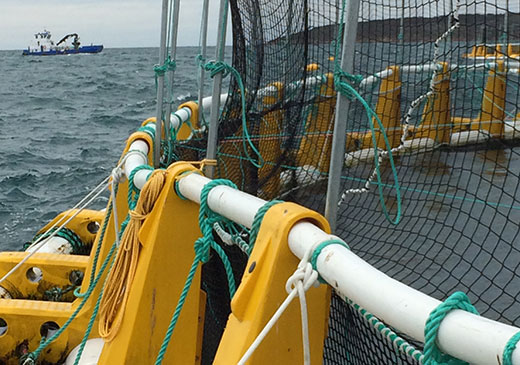An investment of more than $20m will be injected into the Eastern Bay of Plenty to help accelerate the development of aquaculture at one of the country's largest deep water marine farms.
The funds provided through the Provincial Growth Fund will give Whakatohea Mussels Limited, who operate the farm in Opotiki, a boost in the right direction.
Regional Economic Development Minister Shane Jones and Fisheries Minister Stuart Nash made the announcement in Opotiki on Friday morning.
'The PGF will invest in three initiatives which support the overall aquaculture and marine strategy for the Eastern Bay of Plenty,” says Shane.
These include building a mussel processing facility; developing aquaculture interests and settlement assets; and improving the current Opotiki harbour.
'Aquaculture has a proud history in this part of New Zealand and with central Government support, the region can position itself to take full advantage of future opportunities in this growing and high-value industry.”
Twenty-one years in the making, the mussel farm is a commercial project that is part of the Whakatohea Maori Trust Board's long-term vision to generate financial returns and create sustainable employment for the region and its people.
According to the Whakatohea Trust website the farm was established in 2001 when Eastern Sea Farms Limited made an application for consent to farm 3,800 hectares of water space 8.5 kilometres off the coast of Opotiki.
Resource consent was required to farm the water space and this was granted in 2009 for a period of 20 years with the right to renewal.
'It has taken 10 years of legislative change and resource consent approval to get to this point,” says Whakatohea.
'ESFL undertook five years of research and this was carried out by our science provider, The Cawthron Institute.
'The Cawthron Institute report, Feasibility of Open Ocean Aquaculture in New Zealand examined the climatic influences that determine the engineering design requirements of open ocean farms and the availability of food, growth and condition measurements for mussels, scallops and oysters.
'From here the Cawthron Institute carried out a feasibility assessment of open ocean aquaculture at the Opotiki site on eight species as well as a feasibility study into Greenshell mussels and New Zealand sea cucumbers.”
Since this time ESFL has been carrying out a small scale mussel commercial trial to verify the research data.
Also discovered in their research is the need for mussel barges, which has meant the need for an upgrade at Opotiki's Harbour.
During Friday's announcement, the Government has announced the PGF investment will help towards these developments.
'We'll support Whakatohea Mussels Opotiki Ltd with an initial investment of $850,000 to progress further work on a business case for a mussel processing facility.
'The Government has also agreed, subject to the successful outcome of the business case, to invest up to a further $19 million to support the construction of the on-land mussel processing factory.
'When fully operational this initiative has the potential to create more than 200 jobs in the region year round.”
The Whakatohea Māori Trust Board will also receive up to $950,000 to prepare a business case to accelerate the development of its aquaculture interests and settlement assets, says Shane.
'The study will include looking at the potential for a commercial mussel farm and spat catching site including a scientific assessment for a deep sea water farm site.”
A further $750,000 will be provided to assist with the development of a business case to progress an affordable Opotiki Harbour plan, he says.
'This is the first step to transform the harbour into a productive area to support marine farming in the region. We're committed to working alongside the region to support this important work.”
He says the Government has recognised the opportunity for the Eastern Bay of Plenty to transform its economy, develop significant employment and improve the region's standard of living through the projects.
'The Government, through the Provincial Growth Fund, is proud to get in behind these projects.”
Stuart Nash says aquaculture presents a compelling opportunity to transform the economic and social potential of regional centres throughout New Zealand.
'We're committed to investing in the development of these opportunities,” says Stuart.
'Seafood export earnings reached $1.8 billion in the year ended June 2018, up 1.9 percent on the previous year.
'We expect strong prices and increased aquaculture export volumes to boost export earnings to just under $2 billion by 2020.
'Aquaculture is set to be the main driver for the forecast growth, thanks largely to increased mussel harvests, and higher prices as demand continues to grow in key markets.”
Waiariki MP Tamati Coffey has expressed his support for Friday's announcement.
'Maori, jobs and our local industries are clear winners from Friday's investment in the future of the Eastern Bay of Plenty.
'I am proud of this coalition Government's proven commitment to revitalising our regions: from $20 million into the aquaculture and mussel industries of Opotiki and around the Whakatohea Rohe Moana; to better connecting our whanau digitally through investing in development projects for Ngati Awa.
'For too long the growth of Aotearoa's major centres has been fuelled by the wallets of the Waiariki. Now that changes.
'These investments in our community's potential are recognition that the people of our rohe are best placed to determine how to achieve our aspirations, and shape our own tomorrows.”



0 comments
Leave a Comment
You must be logged in to make a comment.